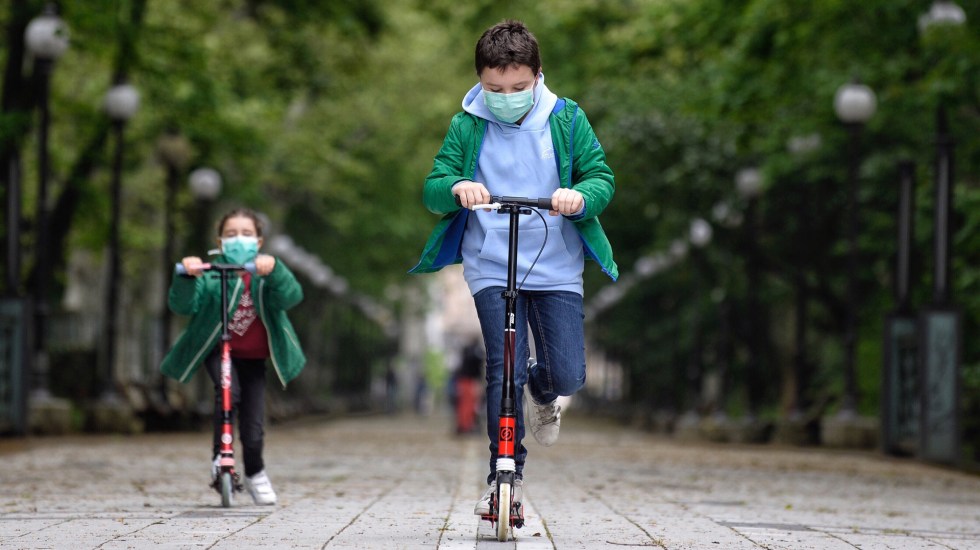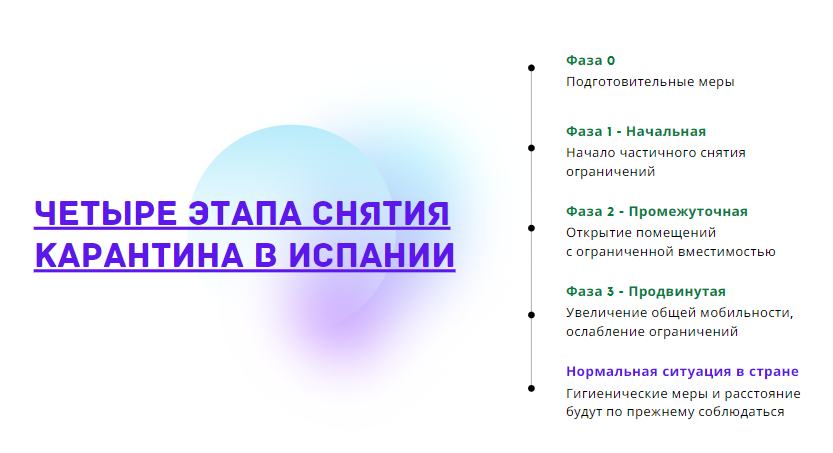
This Tuesday, Prime Minister Pedro Sánchez presented a plan to exit self-isolation. It has 4 main phases. Each of them will be implemented depending on the health and epidemiological situation in each region. Phase 0 has already begun in all of Spain and will last until May 10.
There are still many questions that the authorities will have to answer. Based on the available information, the following stages can be distinguished:
.
Phase 0
All of Spain is already in phase 0. During this phase, preparatory measures will be implemented. In addition to general measures such as walks for children and families living in the same house, individual sports activities, “small loopholes” for economic activity are also being opened.
Pre-registration: Various service areas can open with the condition of pre-registration for individualized customer service. This is for example some restaurants or hairdressing salons. These premises should guarantee maximum individualized protection for their customers.
Professional sports: individual training by federal athletes and professional leagues is allowed.
Non-professional sports: non-contact sports (cycling, running, skating, surfing, etc.). Will be allowed in the near future if they are played individually and with proper protection (distance, mask).

Phase 1- Initial
Social contact. Opportunity for contact between small groups of people without pre-existing pathologies and those who are not vulnerable. More restrictive conditions will be established for the elderly or those with pathologies.
Trading: will begin in smaller stores “under strict security conditions” but not in larger stores “where crowds are more likely”. Any business that reopens will have a 30% capacity restriction. Maintaining a minimum distance of 2 meters between customers. Special service schedule should also be set for people above 65 years of age.
Markets: open-air market activities may be reopened with conditions of distance between stalls.
Restaurants: Opening of terrace only restaurants with 30% seating capacity.
Hotels: Opening of hotels and other tourist accommodation
Agri-food sector: will start resuming agri-food activities that were stopped under the state of emergency decree.
Cultural life: cultural events of less than 30 people indoors and less than 200 people outdoors can be held.
Museums: visits to museums will be allowed, limiting walkability to 30%.
Non-professional sports: outdoor sports facilities with no public and no contact sports (e.g., track and field or tennis) are possible. Individual sports are also allowed by appointment at sports centers that do not involve physical contact or locker rooms.
Non-professional sports: Individual sports are also allowed at sports centers that do not involve physical contact or locker rooms.
Churches and Places of Worship: Churches may open, their capacity will also be limited to 30%.

Phase 2- Intermediate
Social contact: Social contact will be allowed in large groups for vulnerable people or people with pre-existing pathologies.
Second residences: Travel to a second residence will be allowed, but only within the same province.
Trade: visits to stores and supermarkets will be limited to 40%, with an obligation to guarantee a minimum distance of two meters between customers.
Malls: shopping centers or parks may open to the public, prohibiting them from being in common areas or recreational areas.
Restaurants: restaurants, cafes or bars will be allowed indoors, but again with distance between customers. Capacity will be limited to 30%. Discotheques or late-night bars are still closed.
Education: the school year will begin in September, but at that point, exceptions are set for reopening education centers. They can open to allow children under the age of six to go to an education center. If both parents must work in person.
Theaters and cinemas: Cinemas, theaters, auditoriums and other similar venues will be open with “pre-assigned seating,” and seating will be limited to one-third of the usual.
Churches and places of worship: capacity is limited by 50%.
Phase 3- Advanced
This phase involves opening all activities, but always with appropriate safety and distance measures.
Trading: limiting capacity to 50%, with a requirement that there be a minimum distance of two meters between people.
Mall shopping centers: lifting the ban on the use of common areas and rest areas of shopping centers.
Restaurants: for restaurants, cafes or bars, capacity is increased by up to 50%, guaranteeing segregation between customers. Customers in a bar will be allowed to stand with a minimum distance between them of 1.5 meters.
Discos and clubs: clubs and night bars can be opened with a maximum capacity of 30% of the usual.
Beaches: at this stage, the opening of beaches is planned in a safe and people-spacing manner.

How long will all four phases last?
Each of the four phases will have a minimum duration of two weeks, which is the incubation period of the disease. At the end of June, if the epidemiologic curve follows the same trend as now, Spain will be back to normal.
Spain will be back to normal.
Will this happen at the same speed across Spain?”
No, the rules will be the same for everyone, but they will take effect differently in each region.
How will they decide when a new phase begins?”
There are four criteria that can be used to determine whether a province can or will advance to the next phase after two weeks, which will continue for at least each phase:
- possibilities of the health care system
- epidemiological situation in the area
- protection measures in public places
- mobility and socio-economic data
Every 15 days, the same epidemiological and hygiene criteria will be evaluated. From province to province to speed up the return to normalcy.
From province to province to speed up the return to normalcy.
When will it be possible to travel?”
Travel and movement will be restored gradually. Travel between provinces will be possible closer to June. And provided that the province you are in is in the same phase as the province you plan to travel to.


Pingback:Перелеты во время коронавируса - Недвижимость в Испании. Помощь с оформлением ВНЖ и обустройством. Broadway Consulting +34 699 987 298